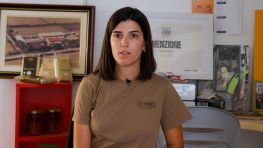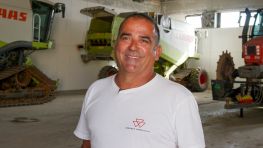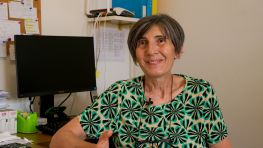 Rosalia Vacca and the Dream of…
Rosalia Vacca and the Dream of… Ilena Maran
Cascina Bosco Fornasara
With a degree in cultural anthropology, Ilena chose to become a farmer together with her husband, taking root in a territory and caring for it with love just like the native populations of her studies. In the interview, Ilena tells her story, the reasons of her choices, plant and animal life in the farm fields and a project of regenerative agriculture that is networking and involving a growing number of people. Another way of farming is possible and it is exciting to see the environment relive, tell the change in progress and exchange experiences and knowledge with other farmers who have taken the same path. Collaboration with many researchers is also a constant opportunity for learning.
Video table of contents
- The choice to become a farmer
- The importance of communication to tell and distinguish our product and get in touch with other realities engaged in regenerative agriculture
- The plants we grow: rice varieties and other crops in rotation
- Our soil is alive and the organic substance is increasing
- Plant and animal species, also of conservation interest, present in the fields
- The role of farmers in environmental protection
- Our plan of planting
- Society’s view on my choice
- An emblematic word for rice paddies: "singing"
- Thinking about our children and the relationship with the earth
- Tourism shows interest in our project
- The project of opening the farmhouse also allows us to learn a lot
- The change underway: another agriculture is possible
Interview information
Country: IT
Region: Lombardia
City: Pavia
Suburb: Nicorvo
Locality: Cascina Bosco Fornasara
Urls: , Cascina Bosco Fornasara
Ilena Maran
Date of birth: 03-16-1986
School: University
Languages: italiano
Document by: Annalisa D'Orsi
Video by: Annalisa D'Orsi, Luca Ghiardo
Created: 21-03-2024
Questo video fa parte del seguente archivio
Rice stories
Rice stories
Food is a fundamental resource for man and his health, both through the supply of nutrients and the ability to embody traits of human culture that play a leading role in our well-being.
Over time, each territory has built original ways in which to relate to the fruits of its land, enriching them with rituals, symbolic meanings and culinary customs. Much of these relationships have been lost following the years of the economic boom, with the exodus from the countryside to urban centers, with the advent of agriculture for mass production and ultimately with the globalization of markets and the consequent impoverishment of the heritage of biodiversity and ethnodiversity.
The purpose of this archive is to collect evidence relating to the main rice production area in Europe, that is the Po Valley, and to investigate, through the analysis of textual sources and testimonies collected in the field, both what survives of this heritage, and the ways in which which has evolved and reached us, paying particular attention to the explicit and implicit links that bind food and health.






